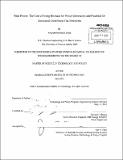Plant power : the cost of using biomass for power generation and potential for decreased greenhouse gas emissions
Author(s)
Cuellar, Amanda Dulcinea
DownloadFull printable version (8.709Mb)
Alternative title
Cost of using biomass for power generation and potential for decreased greenhouse gas emissions
Other Contributors
Massachusetts Institute of Technology. Technology and Policy Program.
Advisor
Howard J. Herzog.
Terms of use
Metadata
Show full item recordAbstract
To date, biomass has not been a large source of power generation in the United States, despite the potential for greenhouse gas (GHG) benefits from displacing coal with carbon neutral biomass. In this thesis, the fuel cycle GHG emissions of power generation from both dedicated biomass power plants and coal power plants with biomass co-firing are quantified using a model based on Argonne National Laboratory's GREET model. The potential for negative emissions by adding a carbon capture and sequestration unit to the power plant is also analyzed. Finally an economic analysis of retrofitting existing coal plants to fire or co-fire biomass is conducted. If no land use change emissions are incurred during biomass production, co-firing as little as 5% biomass with coal can lead to a decrease in GHG emissions compared to coal alone. When a CCS unit is added to the modeled power plants, those co-firing 15% or higher biomass have negative emissions; essentially the plants capture CO₂ from the air. Nonetheless a carbon price of at least $52 per ton CO₂ equivalent is needed to make co-firing plants economically competitive with coal plants and a price of $71 per ton CO₂ equivalent is needed for co-firing plants with CCS. A policy analysis concludes that the lack of political support for biomass power generation stems from the lack of benefits directly related to current policy goals (e.g., energy security), high costs, and the perception that biomass firing with coal is not a 'clean' energy source. Nonetheless, this thesis demonstrates that the potential exists for immediate greenhouse gas emissions benefits from biomass power generation and, through technology development, for a future in which biomass is less costly to convert to power. In order to capture the benefits available today from biomass and to accelerate the development of preferred biomass feedstocks, policy measures are necessary to incentivize biomass power generation. Existing state policies and proposed rules at the federal level are inconsistent and do not provide the necessary incentives for biomass power systems. Two policy measures are proposed: first, a nationwide sustainable biomass certification system and second, policy measures that promote use of biomass that meets the certification criteria. These policies will result in both a supply of sustainable biomass and an increased demand for biomass power generation.
Description
Thesis (S.M. in Technology and Policy)-- Massachusetts Institute of Technology, Engineering Systems Division, Technology and Policy Program, 2012. Cataloged from PDF version of thesis. Includes bibliographical references (p. 85-89).
Date issued
2012Department
Massachusetts Institute of Technology. Engineering Systems Division; Technology and Policy ProgramPublisher
Massachusetts Institute of Technology
Keywords
Engineering Systems Division., Technology and Policy Program.